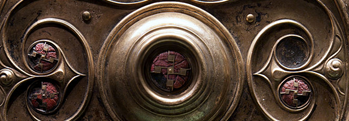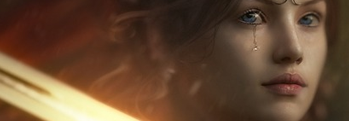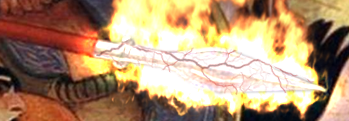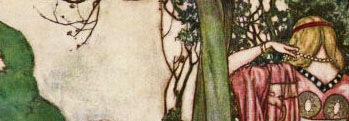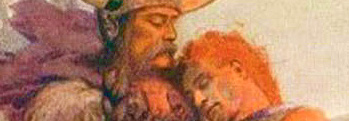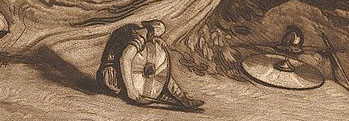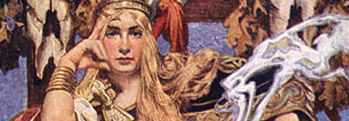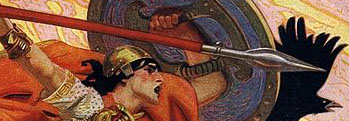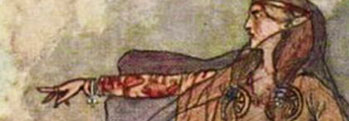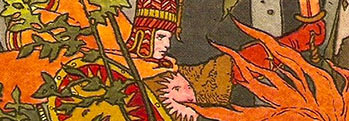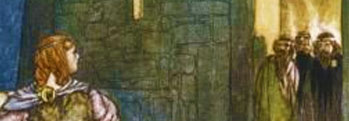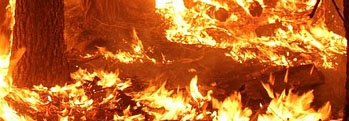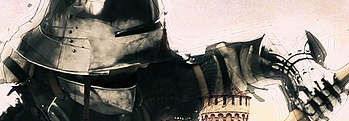The Tain
Irish and Celtic myths and legends, Irish folklore and Irish fairy tales from the Ulster Cycle
Mighty armies mustered for the pride of kings and queens, in The Tain
One of the most famed legends of old is that of the war that was fought over the Brown Bull of Cualgne. Now while it might seem an odd thing for us today to think of a war fought over a bull, the matter is not so simple as it might seem, and the bull was no ordinary bull either! For it was in the time of Cú Chulainn, the hound of Chulainn, that Ireland was ruled by a king and a queen, their names being King Ailill and Queen Medb.
Some years before an argument had arisen between two swineherds who tended the pigs of the Tuatha King Bodb, feared throughout the land for his red thirst, and another Tuatha King, Ochne of Connacht. These were of the fairy folk, the Sidhe, and in their rivalry the swineherds changed shape once, to frogs of the ponds, twice, to strong human warriors, and a third time then to eels of the river, whereupon their struggle came to an end for the time being as they were reborn as two bulls!
 One of these bulls was white and the other brown. The brown bull was owned by a man called Daire of Cualnge, and the white bull was owned by Medb herself, but for reasons undeclared the white bull didn't feel comfortable being owned by a woman, and so strayed to the herds of her husband Ailill. This was unknown to Medb until herself and her husband held their annual reckoning of goods, and found that she had no equal to his mighty white bull.
One of these bulls was white and the other brown. The brown bull was owned by a man called Daire of Cualnge, and the white bull was owned by Medb herself, but for reasons undeclared the white bull didn't feel comfortable being owned by a woman, and so strayed to the herds of her husband Ailill. This was unknown to Medb until herself and her husband held their annual reckoning of goods, and found that she had no equal to his mighty white bull.
In those days, you see, the head of the household could be either a man or a woman depending on who owned the most, so unless she could find something to equal his bull she was seen by one and all as his inferior.
All seemed lost until she heard tell of a bull as mighty as her husband's, a powerful brown bull of stamping hoof and flaring nostril owned by Daire, so she sent an emissary to him asked to borrow his bull. The emissary promised, some say, that the Queen would give him knowledge of herself in exchange, for in those times it wasn't so unusual for people to be more open in certain ways, and he was overjoyed to hear it!
But then he overheard one of the Queen's messengers joking in pride and arrogance that it was as well he'd taken the offer, or they'd have stolen his bull by force. And so they were evicted from his property and told the deal was off in no uncertain terms.
Well it is not wise to defy Queens, and even less so to scorn them, or so the messengers shamefacedly reported, and Medb was wrathful. She summoned to herself mighty armies and powerful men and marched to war so that she wouldn't be shamed. It should by rights have been an easy campaign for the warriors of Ulster were at that time suffering labour pains as the result of a curse inherited from an ancestor of their King, Conchobar, after he unwisely insulted the ancient and powerful Tuatha druidess Macha. You'd think the men of Ireland would have learned to mind their manners but it seemed not.
As they writhed on the ground and clutched their bellies they'd be in no position to offer resistance, she reckoned, and she would have been right only she didn't reckon with Cú Chulainn! And it doesn't do to leave mighty champions out of your reckoning.
This was why, after she sought assurances of success from her wizard Calatin, he could give her none except to say that even if everyone else was lost she'd be coming back. Troubled now, she came on her march to the prophetess Fedelm, who told her four times and once again that she saw only red in the future. Medb was puzzled for she knew the men were stricken low with labour cramps, and she pressed for more.
And Fedelm said to her:
"I see a fair man who will make play
With a number of wounds on his girdle,
A hero's flame over his head,
His forehead a meeting-place of victory.
There are seven gems of a hero of valour
In the middle of his two irises,
There is blood on his cloak,
He wears a red clasped tunic.
 He has a face that is noble,
He has a face that is noble,
Which causes amazement to women.
A young man who is fair of hue
Comes closer.
Like is the nature of his valour
To Cuchulainn of Murthemne.
I do not know whose is the Hound
Of Culainn, whose fame is the fairest.
But I know that it is thus
That the host is very red from him.
I see a great man on the plain
He gives battle to the hosts
Four little swords of feats
There are in each of his two hands.
Two Gae-bolga, he carries them,
Besides an ivory-hilted sword and spear;
death he wields to the host;
Different is the deed for which each arm goes from him.
A man in a battle-girdle, of a red cloak,
He puts across every plain.
He smites them, over left chariot wheel
The Riastartha wounds them.
The form that appeared to me on him hitherto,
I see that his form has been changed.
He has moved forward to the battle,
If heed is not taken of him it will be treachery.
I think it likely it is he who seeks you
Cuchulainn Mac Sualtaim.
He will strike on whole hosts,
He will make dense slaughters of you,
Ye will leave with him many thousands of heads.
The prophetess Fedelm conceals not.
Blood will rain from warriors’ wounds
At the hand of a warrior—’twill be full harm.
He will slay warriors, men will wander
Of the descendants of Deda Mac Sin.
Corpses will be cut off, women will lament
Through the Hound of the Smith that I see."
And it came to pass then that Cú Chulainn was untouched by the ancient curse of Macha, his own blood being one in part with that of the ancient people, the Tuatha, which gave him many magical powers. He stood alone against the entire force of Connacht, armed with his remorseless weapons.
 Now you might ask, and rightly so, how one man could stand against an entire army - wouldn't they catch hold of him and do away with him? In other eras you'd be spot on, but it was the custom and tradition among the Irish at the time not to involve those unable to fight in warfare, so single combats were the usual way of sorting out martial disputes. For what pride could come of defeating a single man with an army? Precious little, only shame and disgrace, nothing to boast of.
Now you might ask, and rightly so, how one man could stand against an entire army - wouldn't they catch hold of him and do away with him? In other eras you'd be spot on, but it was the custom and tradition among the Irish at the time not to involve those unable to fight in warfare, so single combats were the usual way of sorting out martial disputes. For what pride could come of defeating a single man with an army? Precious little, only shame and disgrace, nothing to boast of.
Cú Chulainn stood and fought for days on end, never growing weary or losing a single fight. Champion after champion he put down and more again he slew with his sling, never thinking it too many. Even the Queen's maidservant had her head knocked off her shoulders when he spied her in the distance wearing the Queen's hat, and imagining it herself eyed her well.
Medb had finally had enough of being stalled by these incredible heroics, and so she said to herself, I'll win this war on the battlefield of my own choosing! So she sent her poets to Cú Chulainn to entice him to come and meet her in her tent, where she greeted him in diaphanous clothing that left little to the imagination. But she herself was amazed, expecting to meet a hulking brute of a warlord, when she found he was but a well made lad of seventeen with a downy chin.
She went ahead anyway and by the end of it Cú Chulainn, although a young man still a man, agreed to give her these terms: her army could move forward while he was doing battle, not a foot more or less. Taking this to be the best she was likely to get, Medb accepted the bargain grudgingly. And for his part Cú Chulainn wisely gave her no insult.
So step by step her forces moved onwards, and although her greatest champions were defeated at every turn, they managed to buy her enough time to steal the brown bull and fifty cows besides and spirit them away with her back to Connacht.
And yet still the two who had been swineherds had their own rivalry, so when brown bull came upon Ailill's white bull amid the herds they did battle. North and south, east and west of Ireland they raged, tearing into one another and no man could dissuade or capture them. The sun set and rose again while the green earth below was churned into swamp and shook beneath their hooves.
But the brown bull was victorious and tore his rival asunder at last, spreading him from one coast to the other, and then being brought back to Connacht warily, for the people were starting to get the idea that it was no ordinary bull they had here. But for all their caution the bull was drunk on fury, and slew many before his own heart exploded, and he died.
And that was a tale worth telling, the cattle raid of Cualgne.
Marked on this map you see below is where Cú Chulainn is reputed to have fought his last battle with the Queen's men.
Further Tales from the Ulster Cycle
Alone in County Louth rises a tall standing stone, its only company the ravens overhead and the whispering wind given voice by nearby trees. This is Clochafarmore, which means "the stone of the great man". It was first raised during the bronze age and rises to ove three meters in height, in a place whose name means The Field of Slaughter, ... [more]
War and the arts of war much occupied the people of Ireland, who became renowned for their skill with weapons and in the ways of battle. They fought one another and the many invaders who came to this land, earning not only fame for their arms and the swords and spears they carried, but for their shields as well! Some of the most legended shields ... [more]
Irish legends have this peculiar property – so long and so often have they been repeated down through the millennia that oftentimes one tale might cross into another, over and back, and leave its track behind. Some stories are far older than they might seem, and some contain shadows and echoes stretching back to the very beginning. Such is ... [more]
Bláthíne, whose name means “little flower” in Irish, was one of the ladies of the Tuatha Dé Danann, that mystical race of warlocks whose hardened red-gold bronze had shimmered in the sunshine when they ruled Ireland. Her beauty was famed throughout this world and the otherworld, but her story is a warning to all who ... [more]
It was often the way in olden times in Ireland that women would fight alongside the men, fierce and unbowed, and accorded the honour of warriors too. So it was with the fearless Scáthach, the legendary Scottish warrior woman whose name meant "the Shadow"! She lived in a sinister castle called Dún Scáith, or the For ... [more]
Many and infamous were the weapons of the tribes of Ireland, and fierce the warriors who wielded them in battle, but few were as notorious as the spear of fire and poison, the Lúin Cheltchair, which thirsted for blood so much that it had to be kept in a cauldron of poison, held down with chains by four foreigners – for who would risk t ... [more]
Cúchulainn, although still a young man, had made many powerful enemies, but none more bitter and dark than Queen Medb of Connaught, whose armies he had routed and whose ambitions he'd thwarted. Long into the dark nights of winter, year after year she brooded on the humiliations visited upon her, for undying is the wrath of a Queen. Sh ... [more]
Queen Medb had invaded Ulster and the lands of the north, thinking it would be an easy victory since the men of Ulster were crippled with birth pangs as a result of a curse place on them, but Cúchulainn had dogged her every step savagely. Attacking her supply wagons, ambushing her men from the trees, burning tents at night, he fought sing ... [more]
Queen Nessa had been known as a gentle and sweet natured woman when she was a maid, but through the hardships of the world she became cold and ruthless. Still, for all that she was still a rare beauty and an indomitable warrior, which many men find to be an irresistible combination! And so it was with King Fergus Mac Ríoch, master of all ... [more]
They say the fury of a storm in a high tempest has nothing on the fury of a woman scorned, and few women have ever felt quite so scorned as Aoife the warrior-queen after she found out that her lover Cúchulainn had married another woman, Emer! She had borne a son for him, but in her wrath she decided to turn the child against him. She spok ... [more]
In the age of heroes, forgotten by all but the storytellers and the legend-weavers, when champions strode the land of Ireland, their halls and Duns now covered in moss, echoing to no songs but those of the blackbird and the red-breasted robin, the people of Ulster were gathered together for a great celebration at Emain Macha, the capital of Ulster. ... [more]
A quarrel arose between Queen Medb of Connacht and the King of Ulster regarding who had the most wealth, but all of his men were cursed with the pains of a pregnant woman giving birth so they couldn't ride out to meet her marching army. Only Cúchulainn who had the blood of the Sidhe running through his veins could even walk, let alone fi ... [more]
Cathbad the Druid was well known throughout the lands of Ireland for his subtle skill and cunning ways, he could make birds speak the language of men and the very stones themselves sing, it was said! But like all Druids, he could also tell the portents of the day, as the ripples may be seen from a rock cast into a still pool in the deepest forest. ... [more]
Cruinniuc was a farmer in the northern part of Ireland back in the days of legend, and often legends are told of heroes and their mighty deeds, but this tale is about humbler folk who change the path of history nonetheless. Cruinniuc wasn't a bad sort but his life had been struck with ill fortune for years – his wife had passed away an ... [more]
The chariot games in Ireland of old were a great event – the mightiest of kings, warriors, princes and champions from around the world would travel from afar to watch and join the fiercely contested races. Each man and his team of horses would thunder round the track, and the cheers of the onlookers would shake the hills. And so it was for ... [more]
It was the time of heroes in ancient Ireland, when giants walked the land, before Fionn MacCumhaill had sent the seven shadows of the Glen back to their dark and restless sleep with his flashing sword, and even before his son Oisín had slain the worm of the lakes, when Setanta was young. He it was who became one of the mightiest heroes of ... [more]
King Aillil, husband to Queen Medb whose famous cattle raid started a war with Cú Chulainn, was deep in his cups as the sun set on Samhain night, red and cloud-torn over the ancient fortress of Rathcroghan. Bothered by the whispering winds, he took a notion that it would be a good test of courage if one of his warriors would go out and put a ... [more]
Bricriu of the venomous tongue he was called, and well named indeed he was, for he loved nothing better than to cause trouble and spread rumours and half-truths to unsettle people. As such he decided to hold a great feast, although he knew that by his reputation few would be interested in attending, so he made a special effort to entice them. He ... [more]
One of the most famed legends of old is that of the war that was fought over the Brown Bull of Cualgne. Now while it might seem an odd thing for us today to think of a war fought over a bull, the matter is not so simple as it might seem, and the bull was no ordinary bull either! For it was in the time of Cú Chulainn, the hound of Chulainn, t ... [more]





